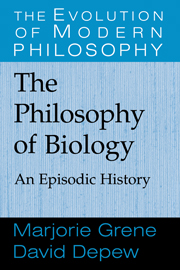Book contents
- Frontmatter
- Contents
- List of Figures
- Notes on Citations and References
- Acknowledgments
- Preface
- 1 Aristotle and After
- 2 Descartes, Harvey, and the Emergence of Modern Mechanism
- 3 The Eighteenth Century I
- 4 The Eighteenth Century II
- 5 Before Darwin I
- 6 Before Darwin II
- 7 Darwin
- 8 Evolution and Heredity from Darwin to the Rise of Genetics
- 9 The Modern Evolutionary Synthesis and Its Discontents
- 10 Some Themes in Recent Philosophy of Biology
- 11 Biology and Human Nature
- 12 The Philosophy of Biology and the Philosophy of Science
- References
- Index
10 - Some Themes in Recent Philosophy of Biology
The Species Problem, Reducibility, Function, and Teleology
Published online by Cambridge University Press: 05 June 2012
- Frontmatter
- Contents
- List of Figures
- Notes on Citations and References
- Acknowledgments
- Preface
- 1 Aristotle and After
- 2 Descartes, Harvey, and the Emergence of Modern Mechanism
- 3 The Eighteenth Century I
- 4 The Eighteenth Century II
- 5 Before Darwin I
- 6 Before Darwin II
- 7 Darwin
- 8 Evolution and Heredity from Darwin to the Rise of Genetics
- 9 The Modern Evolutionary Synthesis and Its Discontents
- 10 Some Themes in Recent Philosophy of Biology
- 11 Biology and Human Nature
- 12 The Philosophy of Biology and the Philosophy of Science
- References
- Index
Summary
Introduction
In the main, it was only in the second half of the twentieth century that the philosophy of biology emerged as a distinctive sub-discipline in academic philosophy. Indeed, the philosophy of science as such – as distinct from “natural philosophy” or just philosophy – is a relatively recent phenomenon. At its start, however, with the rise of logical positivism, soon renamed logical empiricism, it was chiefly a philosophy focused on physics, or even, in its extreme reconstructionist forms, a philosophy based on a rather slanted view, even a caricature, of that “fundamental” science. The life sciences were usually ignored, or treated as an embarrassment to be explained away. True, J. H. Woodger produced in the nineteen-thirties what was supposed to be a statement of the principles of biology; but apart from a few followers in Great Britain, his effort had little influence (Woodger 1937). In general, the hope of philosophers of science was that all the sciences would one day (perhaps even soon?) be unified in the terms of, and through the theories of, the most basic level of physics. For example, at one of C. H. Waddington's conferences on theoretical biology, there was one very vocal participant who kept deploring that the Volterra–Lotka equations, which express regularities in populations, could not (yet?) be reduced to terms of quantum mechanics. Nothing else was really science.
- Type
- Chapter
- Information
- The Philosophy of BiologyAn Episodic History, pp. 290 - 321Publisher: Cambridge University PressPrint publication year: 2004



